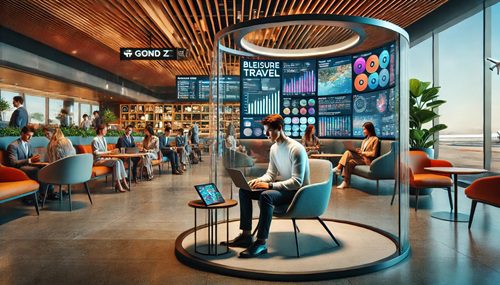 The landscape of corporate travel is undergoing a significant transformation, driven mainly by the unique behaviours and preferences of Generation Z. This shift was prominently discussed at the Global Business Travel Association (GBTA) Convention in Atlanta, Georgia, where industry leaders highlighted the crucial role of communication, diversity, and risk management in meeting the demands of this emerging generation. With ‘bleisure’ travel—a blend of business and leisure—gaining traction, companies must adapt their strategies to accommodate the evolving expectations of Gen Z.
The landscape of corporate travel is undergoing a significant transformation, driven mainly by the unique behaviours and preferences of Generation Z. This shift was prominently discussed at the Global Business Travel Association (GBTA) Convention in Atlanta, Georgia, where industry leaders highlighted the crucial role of communication, diversity, and risk management in meeting the demands of this emerging generation. With ‘bleisure’ travel—a blend of business and leisure—gaining traction, companies must adapt their strategies to accommodate the evolving expectations of Gen Z.
Understanding the Gen Z Traveler: Beyond Traditional Boundaries
Generation Z, often characterized by their openness to diversity and technology, approaches travel differently than their predecessors. Emese Graham, Diversity, Equity, and Inclusion Manager at Flight Centre Travel Group, emphasized the importance of the ‘DITTO’ system when crafting travel policies tailored to Gen Z. “Gen Z in Australia differs significantly from previous generations, with 32% identifying as LGBTQ+1, and only 15% reporting excellent mental health. Growing up amidst global crises, their travel behaviours reflect these experiences,” Graham noted.
The DITTO system—Diversity, Individualism, Teamwork, Technology, and Organizational support—forms the backbone of a travel policy that resonates with Gen Z. Companies aiming to attract and retain this demographic must integrate these elements into their corporate travel programs, ensuring that the needs and values of Gen Z travellers are prioritized.
Communication: The Key to Gen Z’s Travel Experience
Effective communication is paramount when engaging with Gen Z travellers, who favour clarity and convenience. Lydia Paglierani, Marketing Executive at FCM Travel, highlighted the importance of streamlined communication, particularly in risk management and safety. “For me, individualism is crucial, and this extends to how I communicate when travelling for business. I prefer concise updates through a single channel, like push notifications or text messages, rather than being overwhelmed by information from multiple sources,” Paglierani explained.
The emphasis on direct communication is not just a preference but a necessity for Gen Z. The FCM Platform app, which consolidates travel updates into a single, user-friendly interface, exemplifies the type of tool that can effectively meet the expectations of this generation. By minimizing the number of apps and logins required and providing real-time updates, businesses can enhance the travel experience for Gen Z employees, ensuring they feel informed and supported throughout their journey.
Bleisure Travel: A Strategic Advantage for Businesses
The rise of ‘bleisure’ travel among Gen Z has significant implications for corporate travel policies. According to a survey by Corporate Traveller, 32% of Australians aged 25-54 are likely to extend their business trips for leisure, leading to a more rested and engaged workforce. This trend is particularly pronounced among Millennials and Gen X, but the Gen Z travellers are pushing the boundaries of what business travel can entail.
Tyler Hosford, Regional Security Manager at International SOS, pointed out that the ‘bleisure’ trend offers a unique value proposition for both employers and employees. “If you’re in Atlanta for three days for GBTA, you’re likely to explore beyond your work schedule, which introduces new considerations for risks, security, and safety. Incorporating ‘bleisure’ into travel policies not only supports employees but also enhances recruitment by offering a more attractive work-life balance,” Hosford said.
For businesses, the benefits of encouraging ‘bleisure’ travel extend beyond employee satisfaction. Companies can reduce annual leave-related disruptions by allowing employees to integrate leisure into their business trips and promote a healthier, more productive workforce. This approach aligns with the growing recognition that a well-rested employee is more engaged and effective, ultimately contributing to the organization’s bottom line.
Adapting Travel Policies for a New Era
As the corporate travel landscape evolves, companies must reassess their policies to align with the needs of Gen Z travellers. This includes negotiating additional benefits, such as Wi-Fi access, lounge discounts, and meal packages, that cater to this generation’s preferences. Additionally, a comprehensive risk assessment of travel locations, coupled with a clear social media policy, is essential to mitigate potential risks and ensure the safety of Gen Z employees.
Incorporating Diversity, Equity, and Inclusion (DEI) into travel programs is another critical step. Starting with areas such as gender, sexuality, disability, neurodiversity, and race/ethnicity, companies can create a more inclusive environment that resonates with Gen Z’s values. By doing so, businesses comply with ethical standards and position themselves as leaders in fostering a supportive and diverse workplace culture.
The Future of Corporate Travel: A Gen Z Perspective
The influence of Generation Z on corporate travel is undeniable, and businesses that fail to adapt risk falling behind. Companies can position themselves at the forefront of this evolving landscape by embracing the ‘bleisure’ trend, enhancing communication strategies, and revising travel policies to reflect this generation’s unique needs.
In conclusion, understanding and accommodating their preferences cannot be overstated as Gen Z continues to enter the workforce and redefine business travel. The GBTA Convention underscored the need for companies to stay ahead of these trends, ensuring that their travel programs are practical and resonate with the values and expectations of the next generation of business travellers.
Written by: My Thanh Pham





















